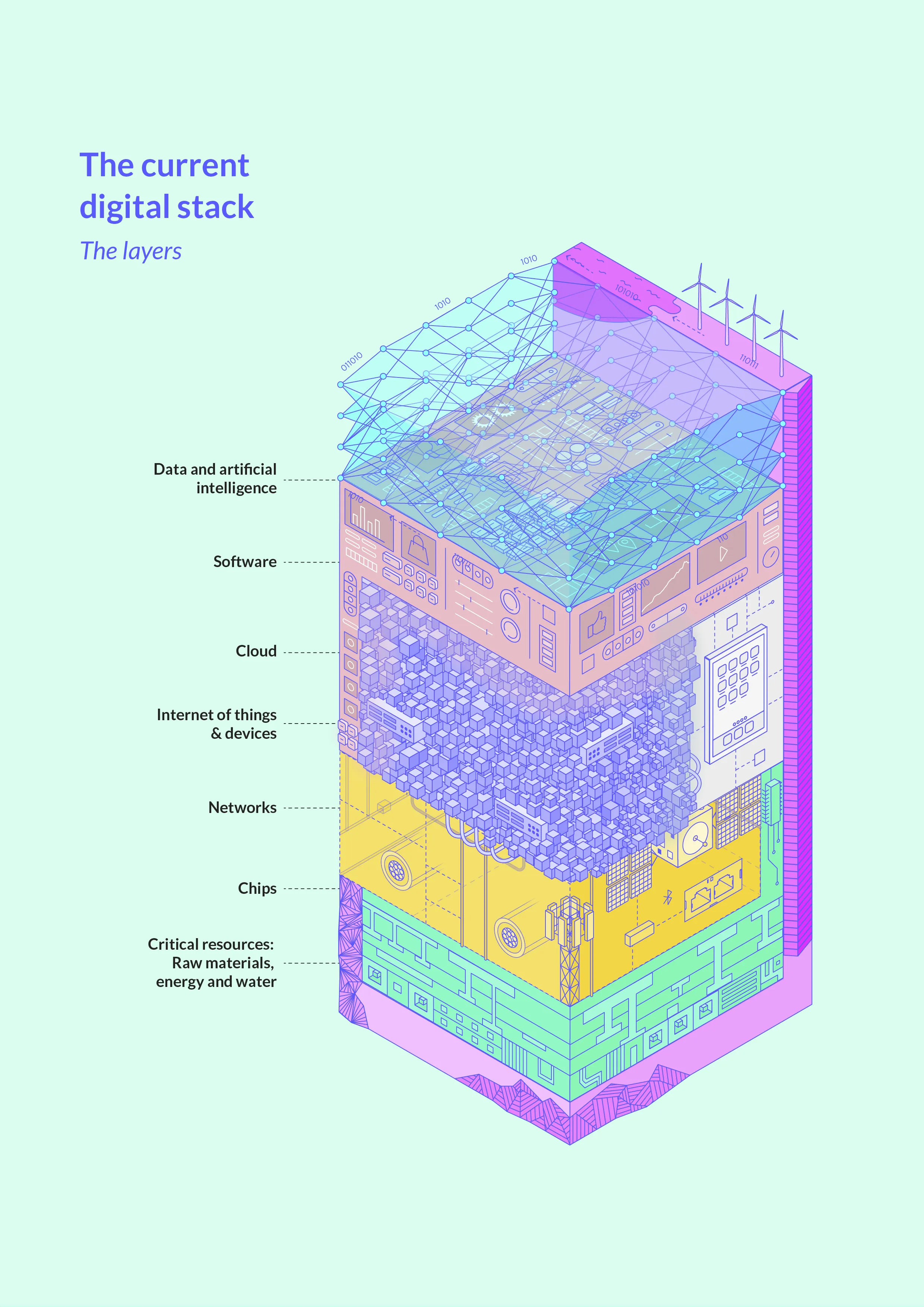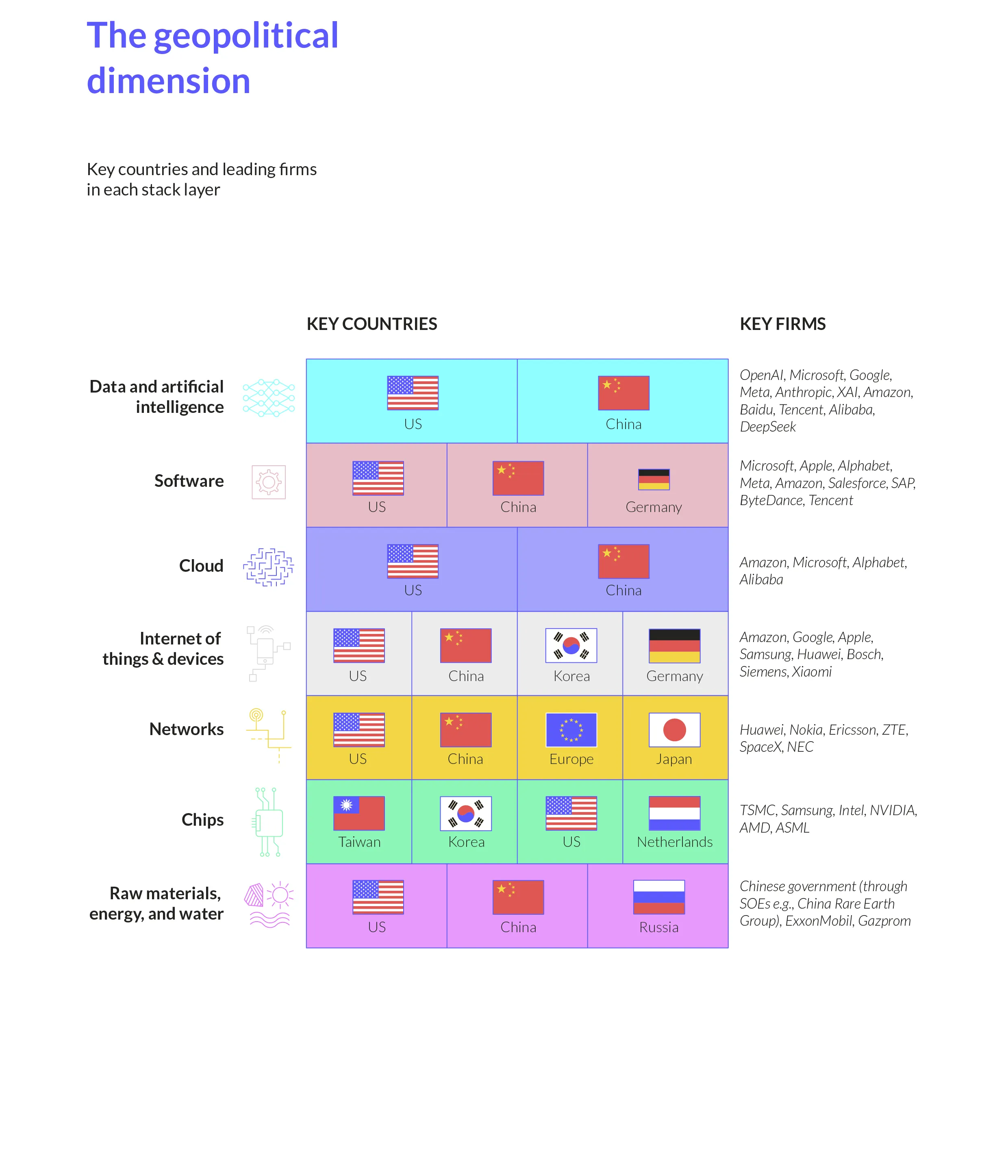Our recent EuroStack report outlines how Europe can strengthen its digital sovereignty through homegrown infrastructure, fair innovation and reduced reliance on non-European tech giants!
Europe stands at a digital crossroads. More than 80% of the digital technologies that companies and public institutions rely on come from outside the continent. This dependency is particularly evident in the field of AI: 70% of the foundational models used worldwide originate in the United States. At the same time, European companies account for just 7% of global research spending on software and the internet – an alarming indicator of Europe’s lag in key digital technologies. This dependency not only weakens Europe’s innovative strength but also threatens its digital sovereignty.
The report EuroStack – A European Alternative for Digital Sovereignty, commissioned by the Bertelsmann Stiftung and supported by a distinguished partner consortium – including the Mercator Foundation, the UCL Institute for Innovation and Public Purpose (UCL IIPP) and the Centre for European Policy Studies (CEPS) – outlines how the EuroStack initiative can help Europe reduce its dependency.
Providing a detailed analysis, the report demonstrates how Europe can build technological resilience and strengthen economic competitiveness by developing its own digital infrastructure. The report was authored by a team of experts, including Prof. Paul Timmers and Dr. Fausto Gerone, alongside Italian digital and data expert Prof. Francesca Bria, a leading advocate for a European, values–driven digital ecosystem.
“Europe’s sovereignty requires a technology leap. We are currently importing technologies that undermine our autonomy and our values. The EuroStack is our ‘moonshot’ moment, the digital evolution of the euro and the single market.”
-Prof. Francesca Bria

The report is divided into three parts:
Part 1: The EuroStack Initiative:
This section outlines the vision behind the EuroStack initiative: leveraging Europe’s industrial strengths to build a common digital infrastructure. Highly scalable digital services (MVPs) in key sectors such as manufacturing, biotechnology, mobility and healthcare are to be used to drive European industrial projects. The initiative relies on open-source innovation and agile development to make implementation efficient. A governance framework ensures that flexibility aligns with European values.
Part 2: The political economy of digital sovereignty:
The second section places the EuroStack within a broader geopolitical and economic context. Big Tech firms dominates the digital stack through vertical integration, while governments struggle to maintain control of key technologies. Meanwhile, Europe faces significant dependencies in raw materials, semiconductors, cloud computing and AI. This section presents concrete policy options, from sovereign data spaces and open, sustainable platforms to targeted investments in strategic technologies such as AI, cloud computing and quantum computing. The authors argue that building EuroStack is crucial to strengthening the European single market, overcoming global challenges and ensuring Europe’s technological sovereignty.
Part 3: Blueprint for a European digital industrial policy:
This section translates the EuroStack vision into concrete recommendations for action. It focuses on coordinated investment, harmonized regulation and public procurement strategies that prioritize European digital solutions. The blueprint focuses on fostering partnerships and agile implementation to ensure Europe’s long-term competitiveness – avoiding unnecessary bureaucracy while ensuring a strong emphasis on innovation and efficiency.
The report shows how a digital single market can be created to foster innovation, support startups and enhance the competitiveness of Europea companies – without relying on the data-extractive business models of non-European tech giants.
EuroStack is more than a technological strategy – it represents an industrial policy vision for a digital Europe that embraces values such as data protection, interoperability and sustainability. Europe’s digital future cannot be left to chance – now is the time to actively shape it.

Background
On September 24, 2024, the event Toward European Digital Independence: Building the EuroStack was held at the European Parliament in Brussels. Organized by a cross-party group of MEPs (EPP, S&D, Renew and the Greens), the event aimed to advance Europe’s digital independence. The meeting brought together leading figures and organizations with practical expertise in open digital commons, covering areas such as open AI models, data spaces, open-source tools, privacy-friendly digital identities and digital payment systems. High-level contributions were made by representatives of the European Commission, key EU member states and international partner countries such as Brazil, India and Taiwan. As a follow-up, the Bertelsmann Stiftung commissioned the EuroStack report to provide a concrete roadmap for building Europe’s digital sovereignty.
Further information about the EuroStack can be found on this website!
This text is licensed under a Creative Commons Attribution 4.0 International License



Write a comment